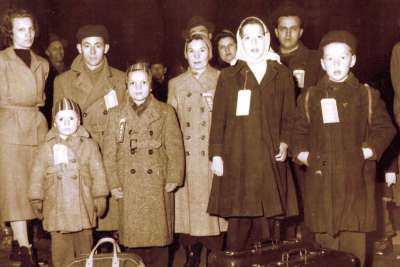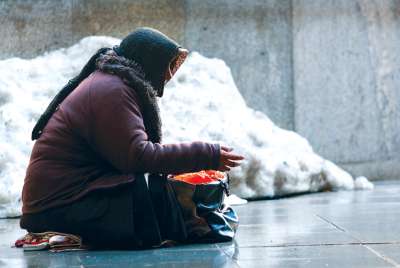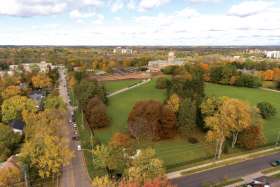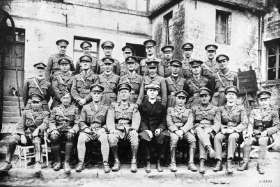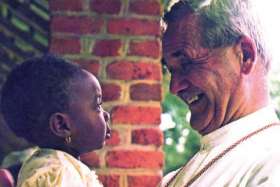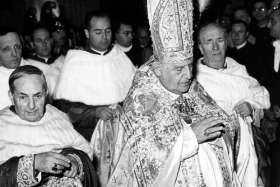Canada has had a long tradition of welcoming refugees looking to escape persecution. One of the most seminal events in that history came in the fall of 1956, when Hungarians revolted against their Communist rulers. They were met with a massive show of force as Soviet tanks rolled through the streets of Budapest and crushed the revolt within days. In early November, thousands of Hungarians began fleeing to Austria. Canada reacted quickly, providing swift approval of refugee claims and within a month they began arriving. Eventually Canada gave asylum to about 37,500 Hungarians and lent support in their first year in Canada. The majority were Roman Catholic, so it’s no surprise the Church played an important role dealing with the new arrivals as this Register story from the Dec. 8, 1956 illustrates.
The Register Archives: A glimpse of the faith, courage of Canada's WWI army chaplains
By Catholic Register StaffThis year, Remembrance Day takes on an extra special aura, as Nov. 11 marks the 100th anniversary of the end of the First World War. Close to 61,000 Canadians lost their lives in the conflict and another 172,000 were wounded. The Canadian Chaplaincy Service was a vital part of the war effort, with close to 450 clergy serving overseas. Among them were 90 Catholic priests who were never far from the front lines. The Catholic Register kept its readers informed with updates from the Chaplaincy Service. The following is the report in the Oct. 31, 1918 issue.
Cardinal Paul-Emile Leger was Canada’s most prominent prelate in the 1950s and ‘60s. Surprisingly, he resigned Nov. 9, 1967 and for the next 24 years, until his death in 1991 at age 87, he dedicated himself to service in the Third World, though he returned to Montreal several times. Here is how he explained his departure in The Register issue of Nov. 18, 1967.
More...
It was eight years ago this week that Canada’s Br. André Bessette was canonized by Pope Benedict XVI. The humble Holy Cross brother who was instrumental in the construction of St. Joseph’s Oratory in Montreal died Jan. 6, 1937 at the age of 91. Over his remarkable life and in the years since, he has been credited with many miraculous healings. During the six days after his death, up to a million people filed past his coffin, surrounded by hundreds of crutches and canes from pilgrims who attested to his gifts. Here is an excerpt from The Register of Jan. 21, 1937:
It was 56 years ago this week — Oct. 11, 1962 — that the Second Vatican Council began its work of addressing how the Church should adapt to the modern world. Vatican II ended three years later and the changes formed the basis of much of the Church’s liturgy and teaching to this day. The massive task of the council, mandated by Pope John XXIII, began with much pomp and ceremony, as The Register reported in its Oct. 13, 1962 issue.
Pope Paul VI made papal history on Oct. 4, 1965, becoming the first pontiff to ever leave Europe and the first to leave Italy since 1809. His destination (he’s also the first to travel by plane) was New York City, where he spent a grand total of 14 hours on the ground. He packed a lot into the quick trip, including a meeting with President Lyndon Johnson and a speech to the United Nations. Here’s a report in the Oct. 9, 1965 issue of The Register on part of Pope Paul’s historic visit.

